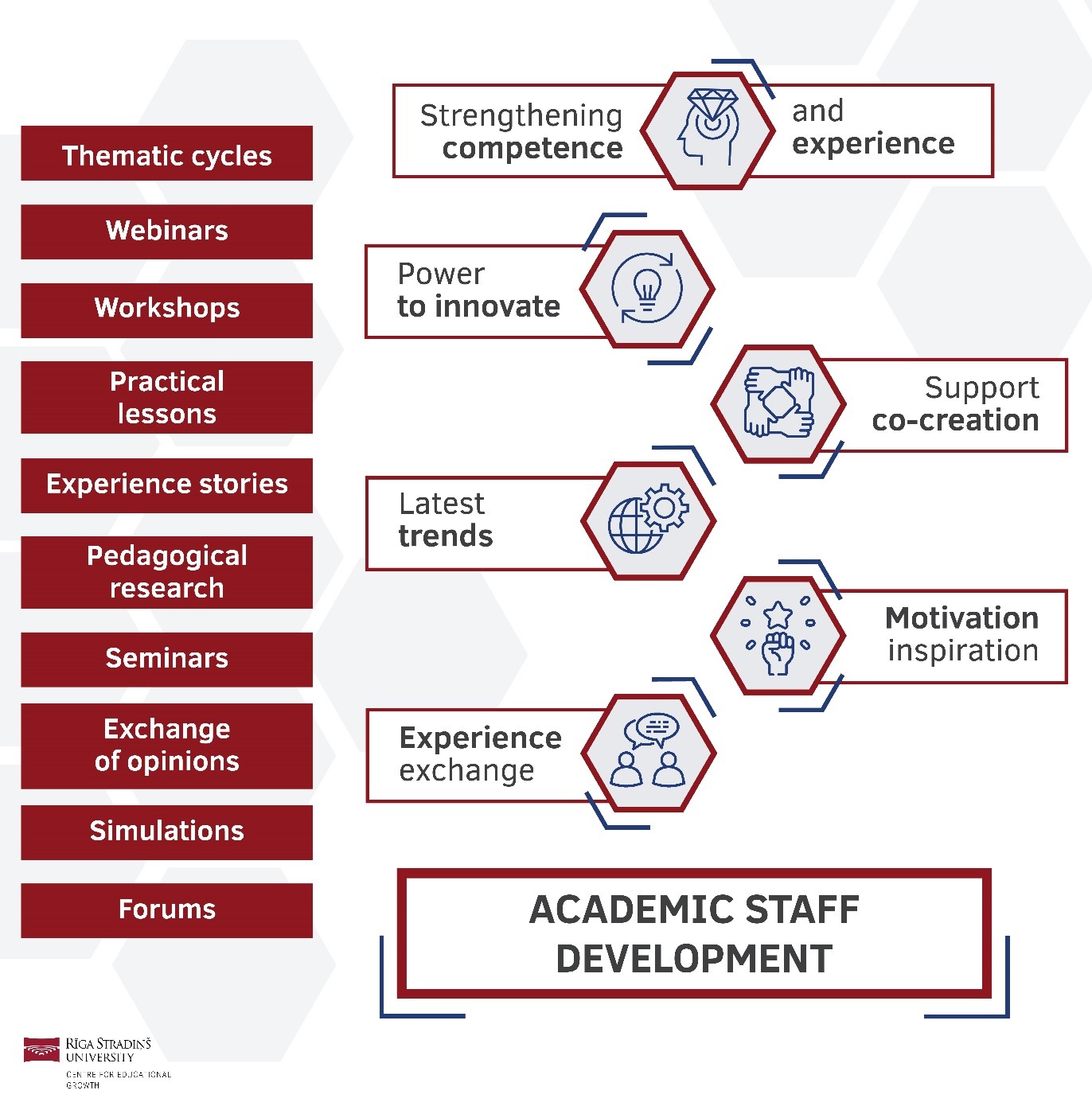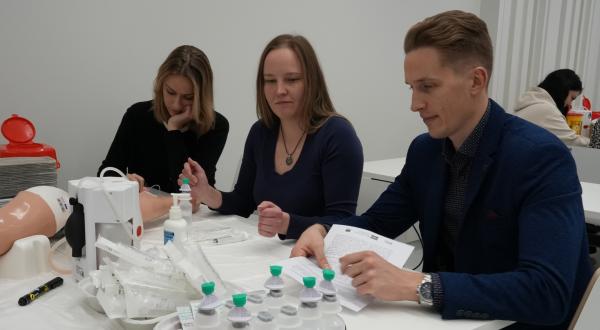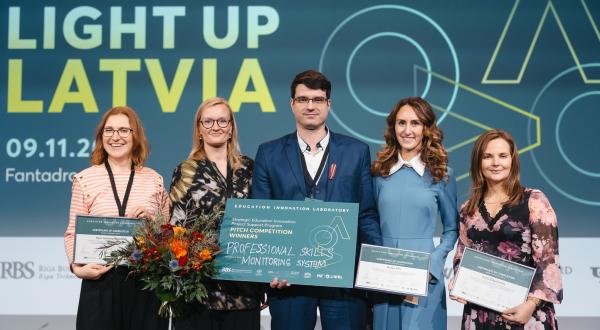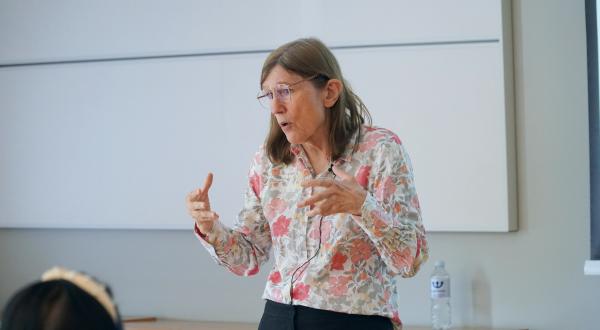Unit for Continuing Education of Academic Staff
The rapidly changing landscape in the world and consequently the changing landscape in higher education emphasises the need for academic staff to be flexible, adaptable and be continuously learning. The interesting and at the same time challenging aspect of teaching is the ability to reconsider and diversify one's teaching approach and methods, and to promote student learning that reflects the current developments in the field and engages students in an active and participative way.
The Unit for Continuing Education of Academic Staff provides an opportunity for academic staff at Rīga Stradiņs University (RSU) to enrich and broaden their paedagogical knowledge and skills. The contents and format of the training provided is based on the analysis of the learning needs of the academic staff and purposefully strengthens the achievement of the aims of improving and modernising the quality of studies at RSU.
A wide range of the competency development training organised by the Centre for Educational Growth is provided to academic staff free of charge every semester. Academic staff members are also encouraged to improve their professional skills through local and international development opportunities outside RSU. The Centre for Educational Growth involves both local and international visiting academic staff in the training offered at RSU, and offers training to academic staff from other higher education institutions in Latvia and actively share their know-how also beyond the borders of the country.
- Adapting training to the needs of target groups
We organise continuing education activities based on study innovation, development and quality improvement initiatives, according to the needs of the target groups (thematic cycles, programmes, lectures, seminars, courses, conferences, discussions, etc.).
- Forms of learning
Over time, face-to-face learning has been complemented by a wide range of online learning, which makes it easier to reach academic staff who perform their duties at more remote RSU study venues, including university hospitals, the Liepāja branch and elsewhere.
- Increase in training participants
The interest of academic staff in various continuing education activities is high and has been increasing over the years. The increase in the number of participants provides an opportunity to reach out to a growing number of the academic staff in the identification of further continuing education needs, which allows to broaden the range of topics and to provide more and more up-to-date and engaging learning.
Unit Functions
When drawing up a training plan for the semester, the Unit for Continuing Education of Academic Staff conducts a thorough study of the professional development needs of academic staff and individuals involved in the learning process by:
surveying participants after each training event;
analysing feedback provided by students in study course evaluation questionnaires;
obtaining information from colleagues at the Centre for Educational Growth, who work closely with RSU academic staff, students, and representatives of administrative units in both internal and external analysis and evaluation of study quality, as well as in the implementation of innovations;
forecasting topics to be included in the learning content based on the latest research findings and international trends.
The higher education and sectoral trends in Europe and worldwide, regularly identified by the Centre for Educational Growth, are incorporated into the learning content for RSU academic staff. This integration helps both the University and its academic staff to adopt a modern approach to learning and teaching.
The content, form and tools offered to participants are in line with trends in the field of higher education internationally, thus contributing to the modernisation of the study process at RSU and to the introduction of innovations.
The experience we have accumulated over more than ten years has allowed us to try out many ways of teaching and to make sure of the most suitable forms and times for learning. An innovative format is tailored for each specific content and audience, which encourages participants to engage, participate and learn actively.
When developing continuing education programmes for academic staff, great care is taken to ensure that the learning content is of high quality, practical, and enriching. Rather than offering standardised, one-size-fits-all training, the content is specifically tailored to the RSU context and the needs of its academic staff. This targeted approach, along with the quality of the content, is supported by colleagues at the Centre for Educational Growth, who incorporate their extensive experience from internal RSU collaboration and their deep understanding of various aspects of the study process.
Each training programme is designed from two key perspectives: that of the academic staff, who create the learning content, and that of the students, who experience the learning process and work towards achieving the intended learning outcomes.
A crucial element in ensuring meaningful learning experiences for academic staff is the creation of a safe environment—one that encourages questions, discussions, the exchange of experiences, hands-on practice, experimentation, and even learning from mistakes. Practical training sessions provide opportunities to explore different tools and methods in a supportive setting. Additionally, close cooperation between the Centre for Educational Growth and the Student Union helps to incorporate students’ perspectives, expectations, and experiences. This collaboration ensures that student-centred learning solutions are developed in partnership with academic staff, ultimately enhancing the quality of teaching and learning at RSU.
The continuing education for academic staff is delivered by:
Colleagues from the Centre for Educational Growth – Experts in pedagogy with extensive experience in both the academic and administrative aspects of RSU’s study process. Their commitment to researching and implementing innovative solutions in higher education drives the continuous improvement of teaching practices.
RSU academic staff and professionals – Experienced educators and researchers who actively explore new pedagogical approaches, conduct research on their teaching practices, and share their insights with colleagues.
International experts – Knowledgeable professionals from higher education institutions and related organisations abroad. They bring an international perspective, enriching the RSU study process with global best practices and inspiring new ideas and collaborations.
Industry professionals – Experts from various sectors who provide real-world insights into their respective fields. By sharing their knowledge and experience, they help academic staff create more authentic learning experiences and better prepare students for their future professions.
Students – An innovative approach involves students in planning, developing, and delivering continuing education content for academic staff. This fosters a constructive dialogue, provides valuable student perspectives, and strengthens collaboration between students and educators.
The unit not only offers high-quality teaching content but also manages the day-to-day organisation of teaching and peer observation, ensuring that development opportunities are easily accessible to academic staff and their participation can be tracked in terms of content and numbers.
Planning of Training Content
The latest international trends in higher education are continually assessed, with appropriate learning organisation methods and interactive approaches selected to support the innovative pedagogical development of academic staff. This provides valuable ideas for academic staff and encourages them to explore different learning experiences, fostering innovation in student learning.
The training organised by the Unit for Continuing Education of Academic Staff is also well attended by general staff members, further enhancing overall competence within the academic environment.
Each semester, continuing education training of varying content and scope, amounting to approximately 170 academic hours, covers the following thematic areas:
- Peadagogy (student-centred learning and teaching in higher education, education management)
- Technology-enhanced learning and teaching (e-learning environment, educational technologies, digital transformation, artificial intelligence, etc.)
- Research (methodology, scientific literature analysis, science communication, support for student research, etc.)
- Transversal skills (academic ethics, strengthening the culture of academic integrity, skills for communication, collaboration, management, innovation, interdisciplinary thinking and working, data-driven research, etc.)

Peer observation
Peer observation and mutual learning from colleagues are key components of the continuing education for academic staff. Through this process, academic staff have unlimited access to interdisciplinary exchange visits with colleagues both within their own and other departments across the University for structured observation. This valuable and supportive form of professional development enables staff to learn from colleagues, provide feedback on observations, generate new ideas, refine the continuity and content flow of the study process, and gain numerous other valuable insights.
Regulations for Continuing Education of Academic Staff
The development of academic staff competence at RSU is institutionalised as a systematically organised process implemented in accordance with internal and external laws and regulations.
Internal regulations
The full cycle of continuing education for academic staff is documented in the Process No 27 “Pedagogical Development of Academic Staff". It sequentially describes all the stages of planning, communicating, implementing and also managing the training, which gives the academic staff a clear picture of the progress and the conditions embedded in the process.
The Centre for Educational Growth monitors attendance at the University level, while deans and heads of academic departments actively encourage academic staff to enhance their knowledge and skills through daily organisational efforts. A dynamic overview of training attendance organised by the Centre for Educational Growth is accessible to each academic staff member via the Academic Portal.
External regulations
The professional development of academic staff is regulated by the Cabinet Regulations No 569 “Regulations on the Education and Professional Qualification of Teachers and the Procedure for Professional Development of Teachers”. They stipulate that a representative of the academic staff must complete 160 academic hours of professional development by the end of their term of office.
Unit for Continuing Education of Academic Staff
Related news
 School of Junior Academics: the power of peer learning and innovation in teachingPedagoģiskā izaugsme, For RSU Employees, School of Junior Academics
School of Junior Academics: the power of peer learning and innovation in teachingPedagoģiskā izaugsme, For RSU Employees, School of Junior Academics Erasmus+ SkillTrack project has concludedPedagoģiskā izaugsme, International Cooperation
Erasmus+ SkillTrack project has concludedPedagoģiskā izaugsme, International Cooperation RSU project ‘Professional Skills Monitoring System’ recognised as best at Light Up Latvia conferencePedagoģiskā izaugsme, Development
RSU project ‘Professional Skills Monitoring System’ recognised as best at Light Up Latvia conferencePedagoģiskā izaugsme, Development RSU develops projects to innovate study process in collaboration with the Massachusetts Institute of TechnologyPedagoģiskā izaugsme, Development, International Cooperation
RSU develops projects to innovate study process in collaboration with the Massachusetts Institute of TechnologyPedagoģiskā izaugsme, Development, International Cooperation






